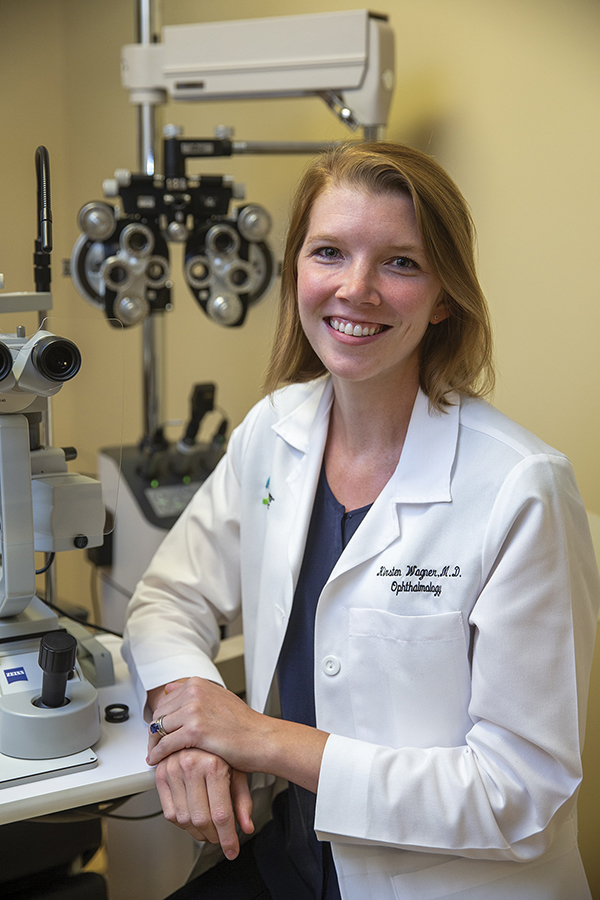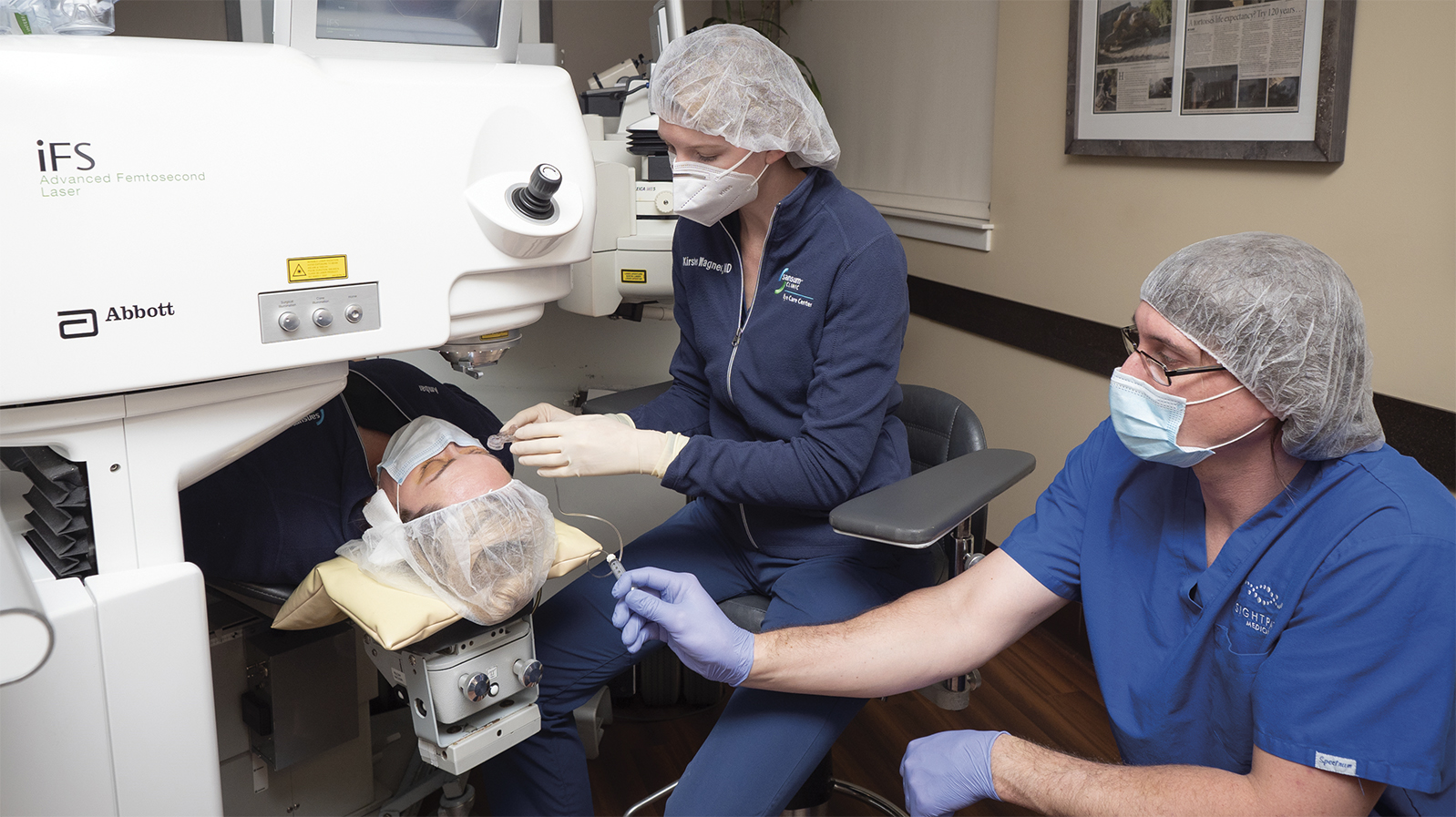
Ophthalmologist Kirsten Wagner, MD discovered how fulfilling her field could be while shadowing a community physician in the small Midwestern town of Springfield, Ohio, home of Wittenberg University where she attended as an undergraduate. The private practice ophthalmologists took her under their wing and introduced her to every aspect of patient eye care, from the operating room to the office business. The experience was the springboard to her becoming a fellowship-trained and board-certified cornea specialist, joining Sansum Clinic’s Ophthalmology Department team alongside five other physicians, each with unique training. “I wanted to be in a place with colleagues to collaborate with, to ask questions and get opinions on more difficult cases,” remarks Dr. Wagner. “I liked Sansum Clinic’s focus on patient care and putting patients first. With our wide network of doctors, it’s easy to coordinate care between the specialties.” Dr. Wagner felt her fellow physicians approached patient care with a similar mindset, recommending and diagnosing as if the patient were a family member or friend, and educating and explaining to make the patient feel that is the frame of reference.
Dr. Wagner earned her medical degree from Georgetown University School of Medicine. Her third-year clinical rotation in ophthalmology solidified her interest in the field. “I loved being able to see patients in clinic and then take them to surgery and fix something and follow them after,” she comments. Dr. Wagner continued her medical education with an ophthalmology residency, where she trained in cataract surgery and in diagnosing and treating common eye conditions, using the latest technology as well as cutting-edge research. She earned Chief Resident status at MedStar Georgetown University Hospital and the Washington National Eye Center (WNEC). The diversity of healthcare organizations within Washington, DC provided a wide range of clinical experiences. Rotations through county hospitals, military hospitals, community clinics, the VA system and the National Eye Institute offered quite unique and varied learning opportunities. She then went on to complete a cornea and external eye disease fellowship at Wake Forest Baptist Health University Medical Center in North Carolina. This additional year of surgical training allowed Dr. Wagner to specialize in medical and surgical care of corneal diseases. Being the only other large academic center for hundreds of miles managing complex eye conditions, Wake Forest proved to be an excellent training ground due to a large number of high acuity patients seen there. “Volume of patients with that pathology is most beneficial in a fellowship,” says Dr. Wagner. “Studying the procedures gives you a baseline of knowledge, but it’s really the repetition, and doing it with mentors like the amazing ones I had that makes you most proficient at the end. “
Cornea specialists can detect and diagnose particular vision problems that are more complex than common eye conditions. Patients with eye issues that involve the cornea such as corneal ulcers/infections, corneal scarring, corneal dystrophies, and more complicated corneal conditions. Subspecialty training in corneal diseases is critically important for patients since the cornea is a quite vulnerable area of the eye, providing most of its focusing ability. Some of the surgeries Dr. Wagner performs include: full and partial thickness corneal transplants, refractive surgery such as LASIK and other laser vision correction, laser-assisted cataract surgery and complex cataract surgery. One type of partial thickness corneal transplant called DMEK uses a donor tissue graft that is placed into the eye. “The advantage of this procedure is there is less risk of rejection to the patient, and the patient is less dependent on glasses after DMEK versus the other types of partial thickness corneal transplants,” explains Dr. Wagner. “It was great to be able to train in all the different techniques, old and new, and to be comfortable with both. “

Volunteering abroad has been a rewarding part of Dr. Wagner’s life since her first international trip to South Africa as a young college student. She traveled with a professor to the tiny country of Lesotho, whose population is stricken due to the HIV-AIDS epidemic. She worked to help children who lost parents to the disease and shadowed a pediatrician at an HIV clinic which sparked her interest in international medicine. Medical brigades to Honduras during residency and fellowship pointed up the pronounced health disparity in the developing world. An even greater takeaway from the experience, says Dr. Wagner, was the appreciation from patients grateful to receive care in places where the numbers of medical needs often exceeds the number of doctors there to provide it. “It felt great to offer an extra set of hands, to have the skills set needed to help the hardworking Honduran ophthalmologists,” shared Dr. Wagner.
Whether overseas or here in Santa Barbara, the immediate gratification patients receive with these eye procedures, and with their continuity of care, is extremely fulfilling, according to Dr. Wagner. The proximity to the beach or mountains in a temperate climate doesn’t hurt either, she notes. “There is an initial shock value of just how beautiful it is here. My husband (Anesthesiologist Dr. Kurt Wagner) and I enjoy outdoor activities with our dog a great deal.”
Professionally, the chance to join other ophthalmologists with “a staff who are all so patient-focused” turned out to be the right choice. She describes the team as “an incredible machine” from the front desk patient service representatives to the surgery schedulers to the clinical staff and technicians – all go out of their way to help each other, according to Dr. Wagner. “I was particularly interested in being involved in a larger group where I could hit the ground running, and jump in and help out right away,” she shares. “With such a great network of primary care doctors and optometrists and ophthalmologists, it seemed great on paper. Now that I am here, it has lived up to every expectation.
Sansum Clinic Elings Eye Center, 4151 Foothill Road, Building B, in Santa Barbara, provides a full multi-disciplinary spectrum of ophthalmology services to meet the needs of patients of all ages with the most advanced and comprehensive procedures and treatments. Visit https://www.sansumclinic.org/locations/location/details/foothill-eye-center-building-b for more information on the Foothill Eye Center. Or, you can reach Dr. Wagner and our providers in the Ophthalmology Department at (805) 681-8950.